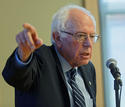The mainstream media are having a field day, and rightfully so, chronicling the meltdown of the once-formidable Republican Party. Less focus has been placed on what may be equally, or greater, divisions emerging among Democrats, both in California and around the country. read more »
Politics
Trump's Industrial Belt Appeal
In his still improbable path to the White House, Donald Trump has an opening, right through the middle of the country. From the Appalachians to the Rockies, much of the American heartland is experiencing a steady decline in its fortunes, with growing fears about its prospects in a Democratic-dominated future. This could prove the road to victory for Trump. read more »
Battle of the Imperial Pretenders
It took the Roman Republic five centuries to devolve into a centralized despotism. It may take ours roughly 240 years to get to the same place, but with decidedly less upside. read more »
Politics Move Left, Americans Move Right
In an election year in which the top likely candidates come from New York, big cities arguably dominate American politics more than at any time since New Deal. The dynamics of urban politics, which are characterized by high levels of inequality and racial tensions—may be pushing Democrats ever further to the left and Republicans toward the inchoate resentment of Donald Trump.
read more »
Hillary Clinton vs. Donald Trump? The Winner Is…the Oligarchy
The real winners in election 2016 are going to be the new-economy oligarchs who are among Clinton’s biggest donors.
This presidential election may have been driven by populist fever in both parties, but at the end, the campaign has left the nation’s oligarchs in better position than ever. As Bernie Sanders now marches to his own inevitable defeat, leaving the real winners those oligarchs—notably in tech, media, urban real estate and on Wall Street—who are among Hillary Clinton’s most reliable supporters. read more »
- Login to post comments
Confronting the Inevitability of Hillary
With her massive win last month in New York, followed up with several other triumphal processions through the Northeast, Hillary Clinton has, for all intents and purposes, captured the Democratic nomination. And given the abject weaknesses of her two most likely opponents, Donald Trump and Ted Cruz, she seems likely to capture the White House this fall as well. read more »
- Login to post comments
Would Reaganomics Work Today?
The key drivers that propelled the Reagan economy are now tapped out or out of favor.
The name of Ronald Reagan is frequently evoked by the current contenders to the GOP nomination. Donald Trump speaks admiringly of the 40th President of the United States and uses a truncated version of his 1980 campaign slogan “Let’s Make America Great Again”. Ted Cruz promises to implement Reagan’s solution of lower taxes, lower regulation and a stronger military. Before he bowed out recently, Marco Rubio was equal in his praise. And John Kasich stakes an even more tangible claim by reminding us that he is the only candidate who actually worked with Reagan. read more »
- Login to post comments
Class and the EU referendum
On June 23rd, voters in the UK get a say on whether to remain in the European Union (EU). The UK first joined what was then called the European Economic Community (EEC) back in 1973, and in a 1975 vote, 67% voted to stay in the EEC. The issue was fairly settled until Conservative Prime Minister David Cameron, under pressure from the right wing of his party and anti EU sentiment, promised an in/out referendum in the Party’s manifesto for last year’s General election. read more »
- Login to post comments
Empire State Building Toward Wins for Trump, Hillary
New Yorkers like to think of themselves as ahead of the curve but, this year, they seem to be embracing the most regressive politics. The overwhelming favorite in Tuesday’s primary among Republican candidates – with more than 50 percent support, according to RealClearPolitics – is Donald Trump, the brash New Yorker whose campaign vows to “make America great again.” On the Democratic side, New Yorkers appear to prefer Hillary Clinton, their former U.S. senator and quintessential avatar of the gentry liberals, rather than feeling “the Bern.” read more »
- Login to post comments
Liberals — Except When it Comes Home
My old boss, Bruce Brugmann, who ran the Bay Guardian, told me early on in my career that you could tell the real politics of a big-city newspaper by the person they endorse for mayor.
Nice liberal outfits like the New York Times support Democrats for president and (typically) governor and US Senate. The SF Chronicle doesn’t endorse many Republicans any more. But when it comes to the local stuff, the decisions on who should run the city where they live and operate and connect with the power structure, the truth comes out. read more »






















